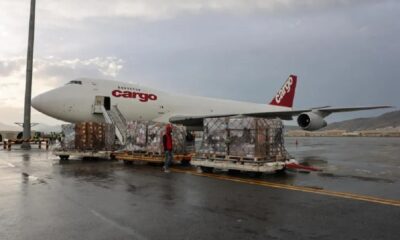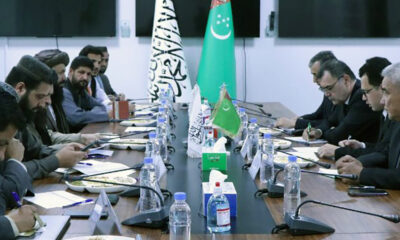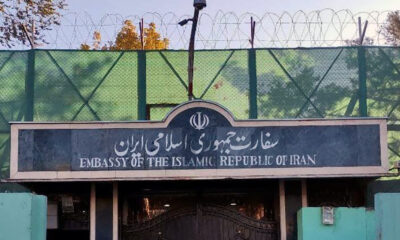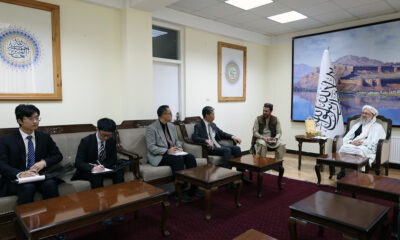Latest News
Explainer: Gaza war after six months – what are the issues now?

Six months since Hamas gunmen stormed into southern Israel on a killing spree, Israel’s ground campaign to annihilate the movement has turned much of the Gaza Strip into a wasteland with an unfolding humanitarian catastrophe.
Mediators have been trying to organize the first extended truce of the war to rush in aid to feed the Palestinian territory’s 2.3 million people and secure the release of some of the Israeli hostages still held by Hamas.
Here is a look at the issues raised by the war and the prospects for peace.
HOW DID THE WAR START?
On Oct. 7, hundreds of gunmen crossed a border fence that Israel had believed was impregnable, and stormed through communities, gunning down Israelis in homes, cars and at an all-night music festival. Israel says 1,200 people were killed in the deadliest day for Jews since the Holocaust. The attackers brought 253 hostages, including whole families with small children, back to Gaza. Although military bases were attacked, most of the dead were civilians.
Prime Minister Benjamin Netanyahu swore vengeance.
WHAT HAS HAPPENED IN GAZA?
Israel’s ground assault began in the northern half of the Gaza Strip and hundreds of thousands of residents were ordered to evacuate and flee south. After a week-long ceasefire at the end of November, Israeli forces turned their attention to the south, again ordering people to flee.
Since February, Israeli forces have patrolled nearly all of Gaza, apart from a small area in the center and the city of Rafah on the southern edge, where more than half of Gaza’s population is now sheltering.
Gaza’s health authorities say about 33,000 Palestinians have been confirmed killed, around 40 percent of them children, with thousands more bodies lost under rubble not recovered. More than 70,000 have been wounded, meaning around 5% of the population has been killed or injured, not counting deaths from hunger, unsanitary conditions and the collapse of health care.
Israel says it has killed more than 13,000 Hamas fighters, and blames militants for harm to civilians for operating among them, including from a network of underground bunkers and tunnels. Hamas denies its fighters operate among civilians.
CAN AID REACH GAZA?
At the outset of the war, Israel imposed a total blockade. Gradually it allowed in aid, first through a pedestrian checkpoint from Egypt, then also through a nearby road checkpoint from Israel itself.
Israel says it imposes no limits on food and humanitarian supplies, but aid agencies and donor countries say cumbersome Israeli inspections mean shipments can be held up for weeks, and only a fraction of the 500 trucks a day Gaza once relied on can get through. Supplies that cross are difficult to distribute or transport because of lawlessness with civil authorities dismantled.
Israel says it is now opening up additional land checkpoints and allowing air drops and sea deliveries. But Gaza has no proper seaport, and aid agencies say air drops are small-scale and dangerous. There is still no land route into northern Gaza where conditions are worst.
IS GAZA EXPERIENCING FAMINE?
Nearly. A famine has three stages – severe shortage of food, leading to pervasive malnutrition, and ultimately mass death from starvation and disease. The Integrated Food-security Phase Classification (IPC) global hunger monitor says Gaza has already surpassed the first two criteria – food shortage and malnutrition – and mass death will begin “imminently” without an immediate aid surge. It projects famine by May.
The IPC has said for months that Gaza is experiencing the most pervasive food insecurity it has ever seen.
In a report in March it said 100 percent of Gazans were experiencing severe food shortages, and for half of the population – far exceeding the 20% rate associated with famine – this had reached the highest level, category 5 or “catastrophe”.
In southern Gaza, where Reuters journalists operate, some residents have resorted to feeding their children boiled leaves. Reuters saw a number of children being treated for acute malnutrition in a hospital in Rafah, while conditions are reported to be far worse in the north.
Israel says the IPC report’s methodology is flawed and claims that there is no shortage of food in Gaza. It blames any hunger on aid agencies’ operations and on militants it says are hoarding food.
In addition to hunger, aid agencies worry about a lack of healthcare and sanitation. There are no fully functional hospitals left in the north, and only a handful in the south. Israel has repeatedly raided and besieged hospitals, saying Hamas fighters use them as bases, which medical staff deny.
Overcrowding fosters the spread of disease, and many people have little or no access to a sanitary toilet or place to wash.
WILL ISRAEL ATTACK RAFAH?
With half of Gazans now crammed into Rafah, residents say there is no place left to flee. Israel says the main Hamas armed units and commanders are sheltering there, and a ground assault is needed to defeat them. It has promised to coordinate with Egypt and to evacuate civilians further north inside Gaza, giving few details.
Washington has called the planned assault a mistake and says Israel can target militants with tactics that would cause less harm to civilians. The United Nations says an assault on Rafah would cause a humanitarian catastrophe. Many Palestinians say they fear Israel’s ultimate aim is to drive them from Gaza into Egypt, which Israel denies.
WHAT IS THE STATUS OF CEASEFIRE AND HOSTAGE TALKS?
Since the war’s only ceasefire so far at the end of November, when Hamas freed around half of its hostages, the sides have held talks mediated by Qatar and Egypt on a further truce.
Both sides have proposed a new ceasefire of around 40 days, including the release of around 40 hostages in return for hundreds of Palestinian detainees. Each has rejected the other’s proposals, but mediators say the talks remain productive.
Israel says it will discuss only a temporary pause in fighting and will not end the war until Hamas is annihilated. Hamas says it will not free its hostages without an agreement envisioning an end to war and Israeli withdrawal.
WHAT IS HAPPENING ON OTHER BATTLEFRONTS?
The war has been accompanied by surging violence in several other Middle East flashpoints, mainly involving armed groups that, like Hamas, are allied to Iran.
On Israel’s northern border it has exchanged regular fire with Hezbollah, a heavily-armed Iran-backed group, forcing the evacuation of tens of thousands of people from villages on both sides.
In the West Bank, where the internationally endorsed Palestinian Authority exercises limited self-rule under an Israeli military occupation, hundreds of people have been killed in the worst violence for decades.
In Syria, Israel has repeatedly targeted suspected bases of Iranian military advisers in air strikes. In Iraq, the United States retaliated against Iran-backed militia groups after strikes on U.S. bases, which have since subsided.
In Yemen, the Iran-aligned Houthi movement that controls the capital has attacked shipping in the Red Sea. Britain and the United States have retaliated with air strikes.
HOW HAS ISRAEL’S RELATIONSHIP WITH WASHINGTON EVOLVED?
As the war has ground on, it has brought increasing friction between Israel and the United States, with little precedent in the 75-year history of their close alliance.
U.S. President Joe Biden strongly endorsed Israel’s right to defend itself against Hamas following the Oct. 7 attacks, but in a speech in Tel Aviv also called on Israelis not to be overwhelmed by anger. Since then he and other administration officials have stepped up calls for Israel to do more to protect civilians and allow in aid.
Washington says its aim is a wider peace deal to normalize relations between Arab states and Israel, which requires prospects for an eventual Palestinian state, a central plank of U.S. policy for decades that Netanyahu has repudiated.
Israel’s plan to attack Rafah has provoked stronger criticism from Washington. In March, the Senate leader of Biden’s Democratic Party called for Israelis to vote Netanyahu out.
Washington later refrained from using its veto to block a U.N. Security Council resolution demanding a ceasefire. Netanyahu responded by canceling an Israeli delegation’s planned trip to Washington.
The United States has continued to supply Israel with arms and munitions. – Reuters
Latest News
Save the Children sends plane with 92 tonnes of medicines to Afghanistan

A plane carrying 92 tonnes of vital medicines has arrived in Afghanistan to treat about 675,000 people, including children, with life-threatening but treatable illnesses after an increase in respiratory infections and measles this year, Save the Children said on Tuesday.
The consignment – the largest delivered by Save the Children in a year – will provide lifesaving treatment for nearly 400,000 children afflicted by endemic childhood illnesses such as respiratory tract infections, pneumonia, acute watery diarrhoea, and skin diseases, the organization said in a statement.
Since the beginning of 2024, more than 1,000 children under the age of 5 have died after contracting pneumonia, comprising 88% of all deaths from respiratory infection.
The current number of cases is higher than the average number reported during the past three years, according to the World Health Organisation.
The number of measles cases among children under five has risen by 44% compared with the same period last year, the statement said.
“Too many children in Afghanistan die from easily preventable diseases and illnesses. The arrival of these medicines means that more than 400,000 children will receive potentially lifesaving treatment in some of the most remote areas of the country,” said Arshad Malik, Country Director for Save the Children in Afghanistan.
He added that every day around the world, roughly 16,000 children under the age of 5 will die from common illnesses that can be prevented and treated.
The medicines, which are worth about US $590,000, were donated by the Dutch Relief Alliance (DRA), the European Union Humanitarian Aid (ECHO), the German Federal Foreign Office (GFFO), USAID’s Bureau for Humanitarian Assistance (BHA) and Save the Children’s internal Humanitarian Fund, among other organisations.
Latest News
Kabir reiterates IEA will not give in to international pressure
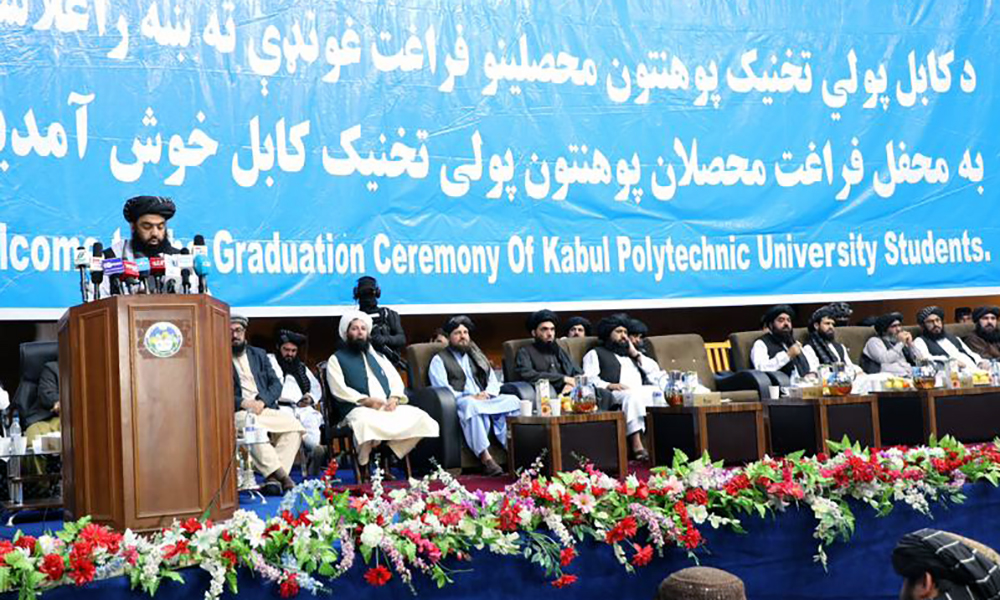
Mawlavi Abdul Kabir, the political deputy prime minister, said on Tuesday that the Islamic Emirate will not give in to international pressure and will not take orders from any country.
Speaking at the graduation ceremony of Kabul Polytechnic students, Kabir said that transit within the region is not possible without Afghanistan and that the government is working on the issue.
Kabir also said the Islamic Emirate of Afghanistan (IEA) is working on the implementation of projects and on developing the mining sector.
He also emphasized the need to provide conditions for the return of immigrants to the country.
The Islamic Emirate’s minister of Propagation of Virtue and Prevention of Vice, Mohammad Khalid Hanafi, also spoke at the event and said the IEA is not against the development of modern sciences in the country, but that Western countries are spreading negative propaganda against the Islamic Emirate.
Nada Mohammad Nadim, Acting Minister of Higher Education, also emphasized that the Islamic Emirate was victorious on the battlefield and will also win in the field of economy, health and education.
On the other hand, some officials of the Ministry of Higher Education said that the ministry is trying to make progress in the direction of scientific and educational expansion and to be equal to global standards.
Over 530 students graduated from seventeen departments of this university, and their graduation certificates were presented by the authorities of the Islamic Emirate.
Latest News
US shows greater willingness to engage with the IEA
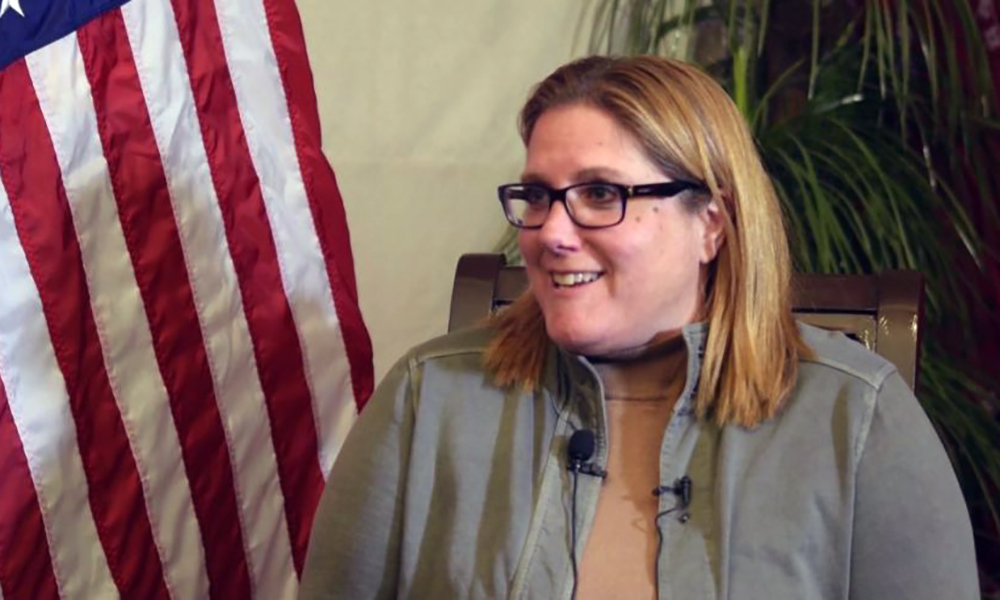
Washington is willing to move towards greater engagement with the Islamic Emirate of Afghanistan (IEA) as it seeks to tread a fine line between its human rights concerns and helping the Afghan people, interviews with top US officials and senior aid figures reveal.
Speaking to The New Humanitarian on the sidelines of a donor meeting in Istanbul last month, Karen Decker, chargé d’affaires of the US mission to Afghanistan, said Washington has “learned the hard way that isolation is ruinous. It’s ruinous for the Afghan people. It’s ruinous for the region”.
In the past year, the UN, several international and local NGOs, and Washington have all signaled that avoiding the Islamic Emirate won’t solve Afghanistan’s economic and humanitarian issues, The New Humanitarian reported.
This comes despite the IEA still refusing to allow girls and women to study beyond the sixth grade.
Decker told The New Humanitarian that Washington is now in a position where it must “very carefully navigate the non-recognition policy”, which requires a delicate balance of keeping in mind that the IEA took power by force rather than a democratic vote while still finding ways to reach the millions of Afghans who require emergency assistance.
One NGO source, who asked to remain anonymous, was quoted as saying by The New Humanitarian that “engagement [with the IEA] is necessary, but we have to find a way to balance engagement while not compromising on our principles.”
Decker agreed, saying Washington would continue to engage with the IEA on “pragmatic issues”, with humanitarian assistance and human rights being her primary areas of concern.
Because its non-recognition policy precludes US officials from working in the country, Washington has partnered with local and international groups on the ground to deliver assistance directly to the Afghan people.
But even with that cooperation, it’s not always so easy, as these groups must also tread carefully amid increasing IEA restrictions and regulations, The New Humanitarian reported.
Even though there is still a long way to go, particularly in terms of addressing US human rights concerns, Decker told The New Humanitarian she feels Washington’s efforts have led to some positive results.
“Eighteen months ago, we were worried about famine, and there is no famine in Afghanistan,” Decker said, crediting this largely to the work of local and international aid organizations.
However, she pointed out that Afghans still need more food assistance than in the past: “So, in some respects, you trade one problem for another.”
Decker raised another issue that adds to the difficulty of engaging further: the Islamic Emirate’s unwillingness to acknowledge any problems in the country: “They like to present Afghanistan as a success story… [and] they don’t want anyone thinking there’s anything wrong.”
She said if the Islamic Emirate were more straightforward to deal with, then humanitarian actors would save a lot of time and money and be able to reach those in need more quickly.
“We use a lot of time and effort making it work, because of the Taliban (IEA). They are fundamentally the challenge to making this work. We are able to navigate [it], but it would be much more efficient if the Taliban were much more [open].”
Decker did, however, give the Taliban some credit, saying they had shown some flexibility, especially in emergency situations.
She pointed to the Islamic Emirate’s responses to a series of earthquakes that rocked the western province of Herat, and the recent mass expulsions of hundreds of thousands of Afghans from neighboring Pakistan, as examples of when the IEA saw it necessary to amend or loosen some of their restrictions, The New Humanitarian reported.
“Women were suddenly allowed to work because they had to reach women beneficiaries,” she said.
While engagement efforts have sparked widespread criticism, all the sources The New Humanitarian spoke to said they saw little benefit in pretending the Islamic Emirate does not exist.
With an “overwhelming need in the country”, simply ignoring the IEA will do nothing to improve the lives of the millions of Afghans who remain in need, said Decker.
“It’s not in anyone’s interest for us to isolate the country,” she added. “And I say this over and over: I feel strongly that if the United States does not advocate for the Afghan people, nobody will. So, I don’t need any more motivation than that.”
The New Humanitarian reached out to the Islamic Emirate’s Ministry of Foreign Affairs for comment on several matters related to the issue of engagement, but it failed to respond.
Decker and other sources did however, express some hope based on private meetings and the public statements of several high-ranking Islamic Emirate officials, who have acknowledged that all girls and women should be allowed to return to school and that the government must expand beyond just the IEA.
“We know that there [are] senior Taliban leaders who have their daughters in school outside of the country, and some of them have even been open in their own statements about the importance of education,” said Decker.
However, for progress to be made towards US recognition, she said the Islamic Emirate must officially change some of its policies, pointing to increased work opportunities for women and real inclusion of non-IEA members in the government as concrete examples of possible game-changers.
-

 Sport4 days ago
Sport4 days agoAfghanistan beat Iraq 5-3, inch closer to Futsal World Cup berth
-

 Regional4 days ago
Regional4 days agoNew UK sanctions target Iranian drone industry
-

 Latest News4 days ago
Latest News4 days agoEU allocates 17 million euros to support Afghans on the move
-

 Latest News3 days ago
Latest News3 days agoPakistan extends registered Afghan refugees’ stay till June 30
-

 World5 days ago
World5 days agoUS student protests over Gaza intensify despite arrests
-

 Regional3 days ago
Regional3 days agoChina to host Hamas, Fatah for Palestinian unity talks
-

 Sport2 days ago
Sport2 days agoAfghanistan qualify for FIFA Futsal World Cup for first time ever
-

 Latest News4 days ago
Latest News4 days agoTripartite trade meeting held in Kabul to boost regional connectivity


